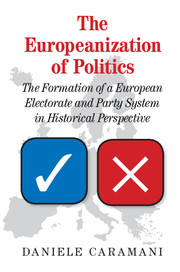 The Europeanization of Politics
The Europeanization of Politics Published online by Cambridge University Press: 05 November 2015
In 2004 The Nationalization of Politics was published, a book on the formation of national electorates and party systems from the 19th century until the present time. In concluding that study I hinted at one possible, natural continuation of that line of work – namely, the analysis of the incipient supra-national integration and formation in Europe of electorates and party systems; their “Europeanization” as it were.
The present volume is a step in that direction. One of the lessons, perhaps the main one, from the nationalization study was that – within the boundaries of the nation-state, the most important political unit over the past two centuries – politics transformed from territorial to functional, with non-territorial dimensions of contestation (first and foremost the left–right class cleavage) overwhelming and replacing territorial ones. With the blurring of national boundaries through European integration, the question is whether today “nationalization at the European level” is taking place along the same lines of nation-states at an earlier stage of political development. Research for this volume, however, soon showed that, rather than “incipient”, electorates and party systems have long been “Europeanized”.
This study thus investigates in a long-term and historical perspective the extent to which electoral politics (voting behaviour, party systems, ideological families) transforms from national, that is centred on national-territorial specificities, to European, with alignments cutting across national units. Similarly to the work on the nationalization of politics, it is an analysis of democratic integration. Europeanization is operationalized as homogeneity among nation-states in Europe and uniform, simultaneous electoral shifts. Further, it is defined in terms of ideological cohesion among parties of the same family across Europe and of vertical correspondence between national and European electoral arenas. Also similarly to the work on nationalization, this study challenges the conventional view that such integration began after World War II. It shows, on the contrary, that the Europeanization of electoral politics is a much longer process, starting in the 19th century, and that a European electorate has long existed and manifested itself through common and simultaneous “waves” of change across the continent – both Western and Central-Eastern Europe.
To save this book to your Kindle, first ensure [email protected] is added to your Approved Personal Document E-mail List under your Personal Document Settings on the Manage Your Content and Devices page of your Amazon account. Then enter the ‘name’ part of your Kindle email address below. Find out more about saving to your Kindle.
Note you can select to save to either the @free.kindle.com or @kindle.com variations. ‘@free.kindle.com’ emails are free but can only be saved to your device when it is connected to wi-fi. ‘@kindle.com’ emails can be delivered even when you are not connected to wi-fi, but note that service fees apply.
Find out more about the Kindle Personal Document Service.
To save content items to your account, please confirm that you agree to abide by our usage policies. If this is the first time you use this feature, you will be asked to authorise Cambridge Core to connect with your account. Find out more about saving content to Dropbox.
To save content items to your account, please confirm that you agree to abide by our usage policies. If this is the first time you use this feature, you will be asked to authorise Cambridge Core to connect with your account. Find out more about saving content to Google Drive.